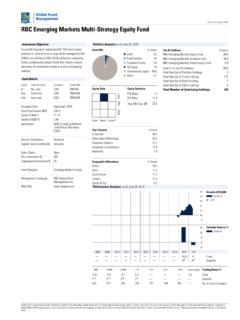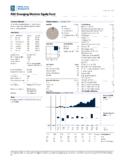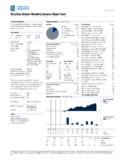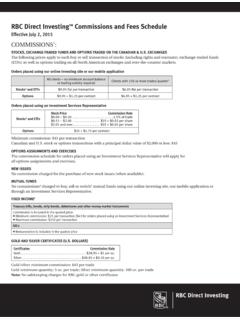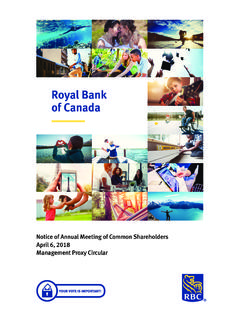Transcription of Does socially Responsible investing HuRt …
1 does socially Responsible investing HuRt investment RetuRns?A common concern about socially Responsible investing (SRI) is that there is a premium to be paid for being socially Responsible that necessarily diminishes investment returns. A comprehensive review of the empirical literature questions this premise. At RBC Global Asset Management, we monitor a broad range of financial trends and issues that may influence our clients decision-making. Periodically, we produce research articles to help provide background for investment decisions on many different levels.
2 This article, an update of an earlier research paper, challenges the myth of lower long-term returns for SRI investors and provides an overview of the current research on the Responsible investing (SRI) has been practiced for more than a century. Almost from the beginning, practitioners, academics and the investing public have asked if the inclusion of social and environmental considerations in the investment decision-making process hurts investment returns. The answer to this question is central to the future growth of SRI. If it is the case that SRI produces lower investment returns, then SRI will never be more than a niche market, appealing solely to those individuals with strong convictions about the types of companies they want to hold and who are prepared to accept less material wealth in order to satisfy these concerns.
3 If, however, it can be shown that SRI produces superior investment returns, then SRI will move further into the mainstream and traditional investment managers increasingly will integrate SRI principles into their investment processes in order to boost returns. Finally, if research shows that there is no material difference between the investment performance of SRI funds and traditional investment funds, then SRI will establish itself as a legitimate investment alternative for those investors who believe companies should be held accountable for their social and environmental practices.
4 Opponents of SRI argue that the application of non-financial considerations, such as environmental, social, and governance (ESG) factors, to the investment process must result in lower investment returns because the number of investment opportunities is reduced. Relying on modern portfolio theory, this position, stated crudely, says that investment portfolios constructed from an investment universe of, say, 2,000 companies will be more efficient ( , they will have higher expected returns and/or lower expected volatility) than portfolios constructed from an investment universe of, say, 1,500 companies.
5 In other words, SRI works with a smaller investment universe and therefore will generate lower expected risk-adjusted returns 1. Supporters of SRI readily admit that the application of ESG considerations will reduce investment opportunities after all, the raison d tre of SRI is to exclude irresponsible companies from consideration but argue that their integration into the investment process delivers benefits that more than offset the loss of portfolio efficiency caused by the more limited investment set. socially Responsible investors believe that integrating ESG factors into the investment process will eliminate companies that are expected to perform more poorly than their competitors.
6 Excluded companies are engaged in unsustainable activities or practices that will make them less profitable over time 2. In other words, companies that embrace corporate social responsibility (CSR) will deliver better financial performance than competitors that do not, and market participants systematically overlook these positive factors. Therefore, SRI proponents argue that any loss of portfolio efficiency due to a smaller investment universe is more than offset by the more attractive investment characteristics of the remaining companies. 1 A useful discussion and more formal treatment of this argument are found in Geczy et al.
7 (2005).2 For example, companies, which are heavy polluters, have a greater chance of facing litigation over their emissions and will use more inputs in is a third view, which to date has not received as much attention. This view holds that, under normal conditions, there should be no meaningful difference between the long-term performance of a broad universe of SRI funds and a broad universe of traditional investment funds that are managed with comparable mandates. This view is based on three premises: The integration of ESG factors into the investment process, providing it employs a best-of-sector approach 3, reduces the investment universe on a random basis; The number of securities eliminated through the integration of ESG considerations is not large.
8 And The smaller investment universe does not produce a material loss of efficiency in portfolios constructed from that of this view have divorced themselves from the ideologically-laden debates about whether SRI funds should perform better or worse than traditional investment funds. Instead, they believe that there should be no expected difference in performance and that the merits of SRI rest entirely with the wishes of individual investors. According to this view, SRI does not involve a Faustian choice between following one s conscience and following one s pocketbook; instead, it is a legitimate investment approach that can be expected to provide investment performance on par with investment funds that do not formally apply socially Responsible investment principles.
9 Given these competing theoretical views, the question of how SRI portfolios perform relative to traditional investment portfolios is, at the end of the day, an empirical one. Research into this question has been approached in four ways: Comparing the performance of SRI indices with traditional indices; Comparing the performance of SRI funds with traditional investment funds/indices; Creating hypothetical portfolios of companies ranked highly against ESG factors and comparing their performance with lower-ranked companies; and Comparing the financial performance of companies that score highly on measures of corporate social performance with those that do remainder of this report provides an overview of the key findings of the empirical research conducted in each of these areas.
10 The main finding from this body of work is that socially Responsible investing does not result in lower investment Comparisons An index is a universe of securities constructed to represent a particular market or asset class. Examples include the S&P/TSX Composite Index, a grouping of about 250 companies representing the Canadian stock market, and the S&P 500 Index, a grouping of 500 companies representing the stock market. While construction rules differ among indices, two important features of most are that: (i) larger capitalization securities have a higher weight in the index than smaller capitalization securities and (ii) the composition of the index is adjusted regularly, either based on the decisions of an oversight committee and/or through a rules-based formulation.
